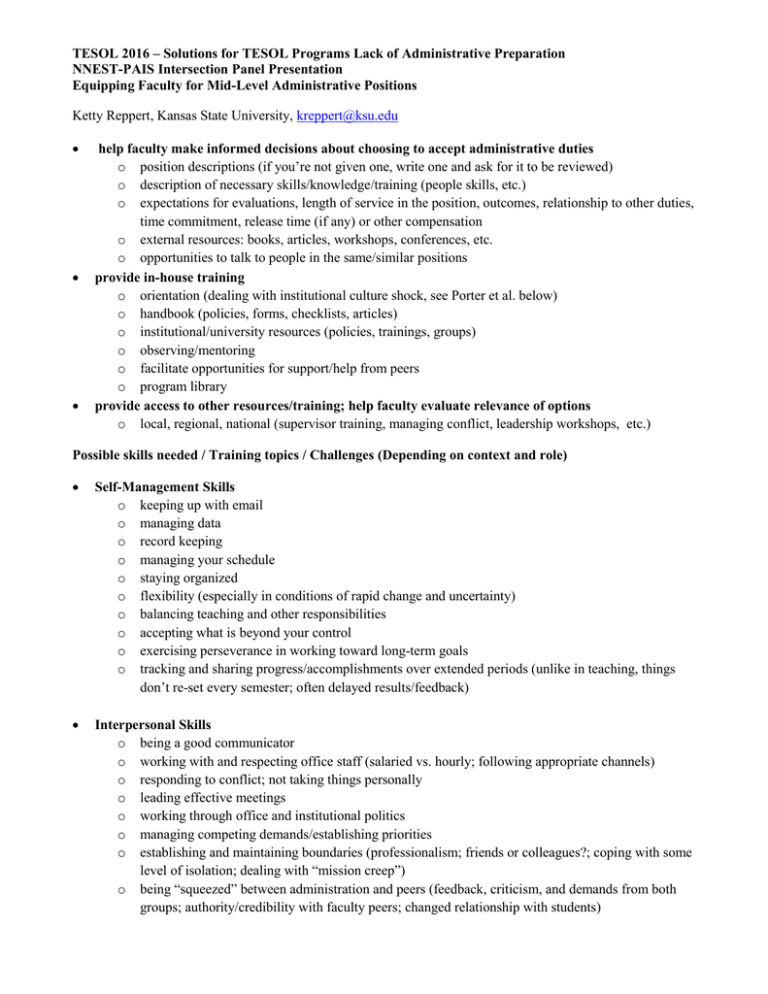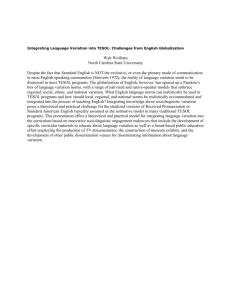TESOL 2016 – Solutions for TESOL Programs Lack of Administrative... NNEST-PAIS Intersection Panel Presentation
advertisement

TESOL 2016 – Solutions for TESOL Programs Lack of Administrative Preparation NNEST-PAIS Intersection Panel Presentation Equipping Faculty for Mid-Level Administrative Positions Ketty Reppert, Kansas State University, kreppert@ksu.edu help faculty make informed decisions about choosing to accept administrative duties o position descriptions (if you’re not given one, write one and ask for it to be reviewed) o description of necessary skills/knowledge/training (people skills, etc.) o expectations for evaluations, length of service in the position, outcomes, relationship to other duties, time commitment, release time (if any) or other compensation o external resources: books, articles, workshops, conferences, etc. o opportunities to talk to people in the same/similar positions provide in-house training o orientation (dealing with institutional culture shock, see Porter et al. below) o handbook (policies, forms, checklists, articles) o institutional/university resources (policies, trainings, groups) o observing/mentoring o facilitate opportunities for support/help from peers o program library provide access to other resources/training; help faculty evaluate relevance of options o local, regional, national (supervisor training, managing conflict, leadership workshops, etc.) Possible skills needed / Training topics / Challenges (Depending on context and role) Self-Management Skills o keeping up with email o managing data o record keeping o managing your schedule o staying organized o flexibility (especially in conditions of rapid change and uncertainty) o balancing teaching and other responsibilities o accepting what is beyond your control o exercising perseverance in working toward long-term goals o tracking and sharing progress/accomplishments over extended periods (unlike in teaching, things don’t re-set every semester; often delayed results/feedback) Interpersonal Skills o being a good communicator o working with and respecting office staff (salaried vs. hourly; following appropriate channels) o responding to conflict; not taking things personally o leading effective meetings o working through office and institutional politics o managing competing demands/establishing priorities o establishing and maintaining boundaries (professionalism; friends or colleagues?; coping with some level of isolation; dealing with “mission creep”) o being “squeezed” between administration and peers (feedback, criticism, and demands from both groups; authority/credibility with faculty peers; changed relationship with students) TESOL 2016 – Solutions for TESOL Programs Lack of Administrative Preparation NNEST-PAIS Intersection Panel Presentation TESOL-related Resources: Boyd, G.L., & O’Neill, M. E. (2006). From the classroom to the boardroom: A guide to the successful transition from teaching to administration for ESL and beyond. Ann Arbor: University of Michigan Press. Coffey, M., Earles-Law, B., Grace, S., Soppelsa, E.F. (1995, May 29). Setting up an in-house cross-cultural counseling office in an intensive English program. Workshop presented at NAFSA National Conference. New Orleans, LA. Coombe, C., McCloskey, M. L., Stephenson, L., & Anderson, N. J. (Eds.). (2008). Leadership in English language teaching and learning. Ann Arbor: University of Michigan Press. Curtis, A. (2013, September 24). A gap in our field: Leadership in language education. Retrieved from http://exclusive.multibriefs.com/content/a-gap-in-our-field-leadership-in-language-education ELT Leadership Management Certificate Program (Online) from TESOL: http://www.tesol.org/events-landingpage/2016/04/25/default-calendar/elt-leadership-management-certificate-program-%28online%29 Porter, A. M., Bus, D., Ravitch, L., & Johnson, B. R. (2013, March). Beyond Institutional Culture Shock. IEPIS Newsletter. Retrieved from http://newsmanager.commpartners.com/tesoliepis/issues/2013-03-04/3.html TESOL Interest Sections: http://www.tesol.org/connect/interest-sections General Leadership/Administration Resources: Academic Leader Newsletter: http://www.magnapubs.com/newsletter/academic-leader-2906-1.html Coursera: https://www.coursera.org/courses/?query=leadership Magna Publications Academic Administration Training Programs: http://www.magnapubs.com/administrators/academic-administration/ Gunsalus, C. (2006). The college administrator's survival guide. Cambridge, Mass.: Harvard University Press. Hackman, J. (2002). Leading teams: Setting the stage for great performances. Boston, Mass.: Harvard Business School Press. LaFasto, F., & Larson, C. (2001). When teams work best: 6,000 team members and leaders tell what it takes to succeed. Thousand Oaks, Calif.: Sage Publications. NAFSA Management Development Program: http://www.nafsa.org/Attend_Events/Annual_Conference/Educational_Offerings/MDP/Management_Developm ent_Program/ Reporte Semanal de Innovación Educativa para Líderes, Tecnológico de Monterrey: http://observatorio.itesm.mx/suscribir/ Shelton, M., & Bauer, L. (1994). Secrets of highly effective meetings (Roadmaps to success). Thousand Oaks, Calif.: Corwin Press. Stress Management Resources: http://www.winona.edu/stress/Default.HTML Tropman, J. (2003). Making meetings work: Achieving high quality group decisions (2nd ed.). Thousand Oaks, Calif.: Sage Publications. Wheelan, S. (2005). Creating effective team: A guide for members and leaders (2nd ed.). Thousand Oaks, Calif.: Sage Publications.
